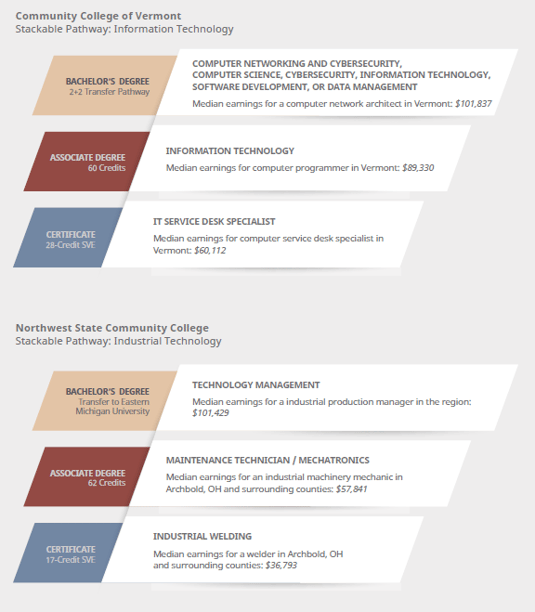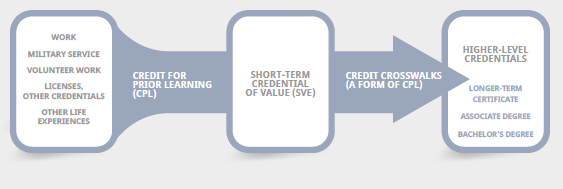Share this
CAEL Releases Research Report on Short-term, High-value Credentials
by CAEL on Apr 18, 2023
CAEL has released, Speed, Value, and Economic Mobility - How Community Colleges Are Developing Short-term, High-Value Credentials, a new research report. For the report, Becky Klein-Collins, vice president of research and impact, and Lana Munip, senior research director, interviewed representatives of 10 community colleges that grant non-degree credentials characterized by Speed, Value, and Economic mobility - or SVEs, for short. In contrast with many other types of short term certificate programs, SVEs are high-quality non-degree credentials that can be completed in one year or less, lead to good-paying jobs in high-demand industries, and can stack into degree programs. These are the ideal kind of short-term program for adult learners and workers who want skills and credentials to access good jobs as a viable alternative to a four-year college degree.
Examples of SVEs and how they lead to good jobs and the possibility for future learning and credentialing are many. Two are shown here:

In these models, the institutions shared how they are using credit for prior learning (CPL) both as an on-ramp to SVE programs as well as a mechanism to bridge noncredit and credit programs. With respect to the on-ramp function, several colleges viewed CPL as a way to recognize knowledge gained from life experiences and work outside the classroom within the SVE program itself. As CAEL has found in previous research studies, CPL can be a powerful tool in bolstering students' confidence as learners, saving them money and time, and boosting completion rates. Several of the colleges also described a credit crosswalk process where CPL was awarded for noncredit credentials, thus further enabling stackability.

Although the 10 colleges represent a diversity of regions, enrollments, and economic conditions, the report revealed common themes relating to the success of SVEs. They include:
- The central role of regional economic drivers in program design.
- A recognition of the importance of seamless stacking of learning and credentials.
- A commitment to equity-centered practices in design and delivery.
- Continued data collection needs, particularly in the area of employment outcomes.
The full report is available at cael.org.
Share this
- Adult Learner Success (113)
- CAEL Members (81)
- Success Stories (80)
- Workforce Development (66)
- Credit for Prior Learning (61)
- Best Practices (52)
- Impact (45)
- Career Pathways Support (38)
- Strategic Partnerships (34)
- Work-based Learning (31)
- Upskilling and Reskilling (27)
- Trends in Higher Education (26)
- Curation (22)
- Inclusion (20)
- Q&A (20)
- Policy (18)
- Retention and Completion (18)
- Talent Management (18)
- Adult Learner 360 (16)
- Research (14)
- Short-term Credentials (13)
- Military-connected Learners (11)
- Student support (11)
- Competency Based Education (CBE) (10)
- Adult Learner Academy (9)
- Transfer Students (9)
- Enrollment (8)
- Student Stories (8)
- Education Benefits (7)
- Experiential Learning (7)
- Featured (6)
- HSIs (6)
- In the news (6)
- NACTEL (6)
- Online Learning (6)
- Case Studies (5)
- Community colleges (5)
- EPCE (5)
- Guest blog (5)
- Wraparound Support (5)
- Apprenticeships (4)
- COVID-19 (3)
- Future of work (3)
- HBCUs (3)
- Structural Approaches to Learning (3)
- Accelerated Program (2)
- Credit Predictor Pro (2)
- Student parents (2)
- Tuition (2)
- Comebackers (1)
- Skills-based hiring (1)
- Upcoming (1)
- April 2025 (3)
- March 2025 (8)
- February 2025 (8)
- January 2025 (5)
- December 2024 (5)
- November 2024 (4)
- October 2024 (8)
- September 2024 (7)
- August 2024 (10)
- July 2024 (9)
- June 2024 (8)
- May 2024 (11)
- April 2024 (5)
- March 2024 (7)
- February 2024 (5)
- January 2024 (7)
- December 2023 (10)
- November 2023 (7)
- October 2023 (3)
- September 2023 (4)
- August 2023 (3)
- July 2023 (5)
- June 2023 (8)
- May 2023 (9)
- April 2023 (5)
- March 2023 (6)
- February 2023 (5)
- January 2023 (3)
- December 2022 (4)
- November 2022 (7)
- October 2022 (7)
- September 2022 (6)
- August 2022 (6)
- July 2022 (4)
- June 2022 (6)
- May 2022 (4)
- April 2022 (4)
- March 2022 (3)
- February 2022 (5)
- January 2022 (5)
- December 2021 (4)
- November 2021 (2)
- October 2021 (8)
- September 2021 (4)
- August 2021 (4)
- July 2021 (2)
- June 2021 (6)
- May 2021 (5)
- April 2021 (9)
- March 2021 (8)
- February 2021 (5)
- January 2021 (4)
- December 2020 (4)
- November 2020 (3)
- October 2020 (6)
- September 2020 (2)
- August 2020 (1)
- July 2020 (4)
- May 2020 (2)
- April 2020 (1)
- March 2020 (2)
- February 2020 (2)
- January 2020 (3)
- December 2019 (2)
- July 2019 (1)
- May 2019 (1)
- February 2019 (1)
- January 2019 (1)
- October 2018 (4)
- September 2018 (1)
- August 2018 (1)
- July 2018 (1)
- May 2018 (1)
- April 2018 (2)
- March 2018 (1)
- February 2018 (2)
- September 2017 (1)
- August 2017 (2)
- July 2017 (5)
- June 2017 (4)
- May 2017 (3)
- March 2017 (1)
- February 2017 (4)
- December 2016 (3)
- November 2016 (1)
- October 2016 (3)
- August 2016 (8)
- July 2016 (2)
- June 2016 (2)
- May 2016 (5)
- April 2016 (2)
- March 2016 (6)
- February 2016 (9)
- January 2016 (4)
- January 2015 (2)
